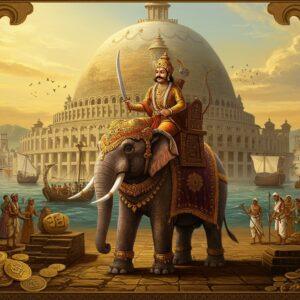
Even in 2025, temples continue to be the cornerstone for culturally rooted Indians, especially those who cherish tradition and authentic rituals. They offer not just spiritual comfort, but also serve as vital preservers of our rich cultural heritage, strengthening the ties that bind our communities. As our society evolves, so too do our temples, gracefully adapting architectural styles and practices while keeping the flame of age-old traditions burning bright. In today’s fast-paced digital world, temples offer a serene sanctuary for reflection and a deep connection with the spiritual. And with the rise of online platforms like Poojn.in, accessing temple-related services and products has become easier than ever, catering to the needs of the modern devotee.
A Journey Through Time: The Historical Context of Temples
Temples in India hold a history as rich and vibrant as our culture itself, evolving over millennia. Ancient temples, such as the magnificent structures built by the Chola and Pallava dynasties, stand as testaments to architectural brilliance. These sacred spaces weren’t just places of worship; they were vibrant hubs of education, art, and culture. They played a pivotal role in preserving our cultural heritage through rituals and festivals, fostering harmony within the community. Through centuries of socio-political changes, temples have adapted and endured, maintaining their relevance in society and continuing their legacy of social welfare and community service.
The Sea in King Solomon’s Temple: A Symbol of Purity
In King Solomon’s Temple, the “Sea” was a massive basin used for ritual cleansing. This grand vessel symbolized the cosmic waters and held deep religious significance in ancient Jewish rituals. The craftsmanship of the “Sea,” as described in biblical texts, was awe-inspiring. Water, a symbol of purity and divine presence, plays a crucial role in religious rituals across various cultures, including Hindu temple practices. King Solomon’s Temple, in fact, is believed to have influenced Indian temple architecture, particularly in coastal regions.
Temples by the Sea: Where Spirituality Meets Nature
The “Temple in the Sea” is an architectural marvel found along India’s breathtaking coastlines. These temples represent a beautiful harmony between nature and spirituality. They’re woven into the fabric of regional folklore and cultural narratives, contributing significantly to local identity. Building temples near the sea presents unique challenges and calls for innovative architectural solutions. Sustainable practices are crucial for maintaining these sea temples and mitigating their environmental impact. Notable examples of these architectural wonders include the Shore Temple in Mahabalipuram and the mesmerizing Stambheshwar Mahadev Temple in Gujarat, both attracting pilgrims and tourists alike with their spiritual allure.
Temples in the Modern Age: Continuing Relevance and Adaptation
Today, temples serve as more than just places of worship. They are sanctuaries for spiritual growth and mental well-being, fostering community interaction and cultural exchange. Economically, temples contribute significantly to local communities, creating jobs and attracting tourists. The integration of technology in temple management has enhanced accessibility for devotees worldwide. Virtual darshans and online puja services cater to a global following, while temples also champion eco-friendly practices, contributing to environmental conservation. Preserving our temple heritage is paramount amidst the rapid pace of urbanization and modernization.
The Cultural and Social Impact of Temples
Temples are living museums of traditional art forms, music, and dance, acting as custodians of our intangible cultural heritage. They safeguard ancient knowledge and rituals, passing them down through generations. Temple festivals are vibrant celebrations that strengthen social cohesion and promote cultural exchange. These sacred spaces connect our youth with their cultural roots through intergenerational knowledge transfer. Importantly, temples also play a role in addressing social issues like caste discrimination and gender inequality. Many temples actively support education, healthcare, and disaster relief efforts, fostering a sense of belonging and identity among Indian communities, both within India and globally.
How Poojn.in Helps You Connect with Temple Traditions
Temples are sanctuaries that offer spiritual cleansing and protection. At Poojn.in, we offer a wide selection of essential items to help you maintain this sacred connection, both at home and during your temple visits.
- Complete Puja Kits: Ready-to-use sets containing everything you need for temple offerings, so you can focus on your devotion. We offer a variety of kits for different deities and occasions.
- Pure Copper Items: Traditional vessels and artifacts crafted from pure copper, believed to enhance spiritual energy during rituals. Find kalaks, lotas, and other essential items.
- Authentic Dhoop & Agarbatti: Premium quality incense for purification rituals, creating a sacred atmosphere in your home or during temple visits. We source our incense from traditional makers, ensuring authenticity and fragrance.
- Brass Temple Bells: Sacred bells that resonate with the traditional sounds of the temple, adding a touch of authenticity to your home prayers. Choose from a variety of sizes and designs.
- Genuine Gangajal: Holy water sourced directly from the Ganges, essential for many temple rituals and considered highly sacred in Hindu tradition. We ensure its purity and proper handling.
We meticulously ensure that all our products adhere to traditional standards and are verified by religious experts. Our temple items are thoughtfully selected to help you maintain the sacred energy of temples in your personal spiritual practice. Need guidance on selecting the right temple items? We’re here to help!
Contact us:
Call: 03369029784
WhatsApp: 9476142738
Shop for all your temple essentials at Poojn.in – India’s trusted Dashakarma bhandar, delivering authentic items right to your doorstep. Consider these beautiful brass statues of deities for your home temple: Brass Hanuman Ji Statue, Brass Ganesha Statue, or find power in these Gomti Chakras.
Conclusion: Temples – The Heart of Indian Identity
In 2025, temples continue to hold profound significance in Indian society, standing as pillars of our cultural heritage and offering spiritual solace, connecting us deeply to our traditions. Temples are adapting to modern needs, embracing technology to connect with devotees worldwide. They are playing vital roles in community building, supporting important social causes, and promoting eco-friendly practices. This beautiful blend of ancient traditions and modern conveniences ensures that temples remain relevant and revered for generations to come. As custodians of art, culture, and spirituality, temples are more than just sacred spaces; they are the very heart of Indian identity, inspiring us all.
Understanding the Significance of Temples: FAQs
Temples have a multifaceted significance, and understanding their various roles can deepen our appreciation for these sacred spaces. Let’s explore some common questions about the importance of temples, particularly the “sea” or basin in temple architecture.
The sea in the temple, often called the “molten sea,” served a crucial purpose in ritual purification. Priests would cleanse themselves in this basin before performing sacred duties, symbolizing spiritual cleansing and preparation for divine service. You might wonder about the sea in King Solomon’s temple. It was a large bronze basin located in the temple court, specifically used for ceremonial washing by the priests.
Why is the concept of a “temple in the sea” so significant? These unique structures, often found in coastal regions, symbolize the harmonious union of spiritual and natural elements, representing the deep connection between human devotion and the power of nature. Thinking about how temples remain relevant in 2025, we see them not just as places of worship but also as vibrant cultural hubs, playing a vital role in community building and preserving traditions while gracefully adapting to modern needs. Learn more about Hindu culture and practices from this informative blog post or delve into the spiritual significance of the Siddhivinayak Temple through this insightful article.
Why do temples matter in contemporary society? They offer a sanctuary for spiritual reflection, a place for community gatherings, and a vital link to cultural preservation, helping maintain our traditions and providing solace in our fast-paced world. This article delves deeper into the sacred spaces of Hindu temples and their significance. Temples contribute to cultural heritage by preserving ancient rituals, architecture, and art. They are living symbols of history and tradition, connecting past generations with the present. They also serve as focal points for personal spirituality, offering a space for meditation, prayer, and connection with the divine, helping individuals find peace and purpose on their spiritual journeys. Exploring the Ernakulam Shiva Temple can further illustrate this point; read more about it here.
How are temples adapting to modern technology? Many are integrating virtual tours, online services, and digital resources for devotees. This adaptation helps reach a wider audience and offers greater convenience while respectfully maintaining traditional practices. Temples remain crucial spiritual centers, cultural landmarks, community hubs, centers of learning, providers of social services, promoters of cultural identity, and even tourist attractions. Their enduring significance in modern society speaks volumes about their adaptability and timeless appeal.


